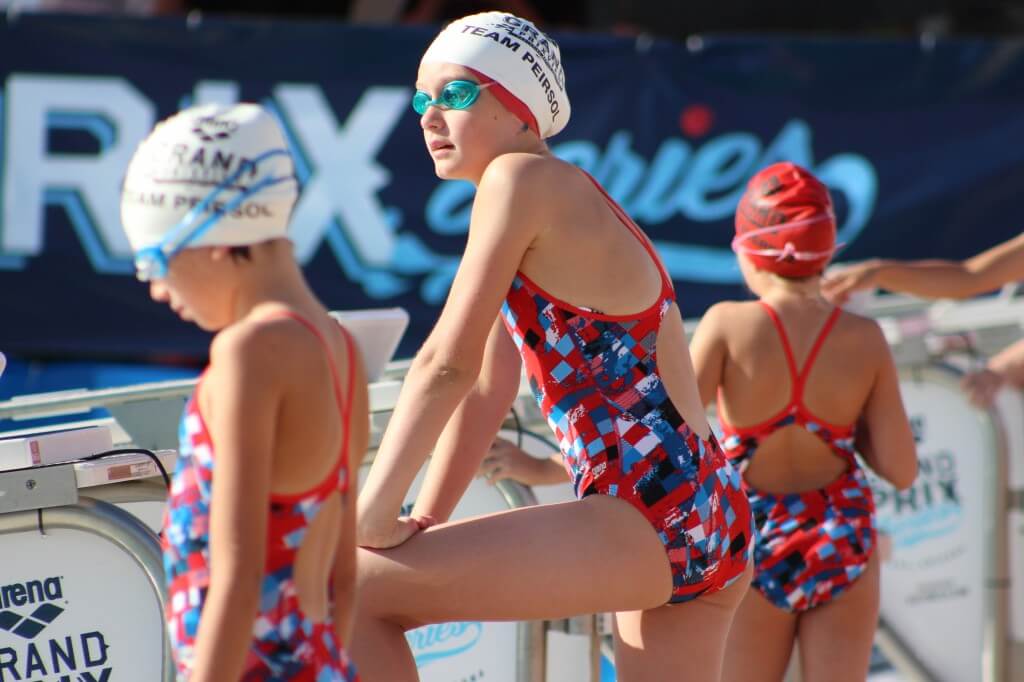5 Thoughts About Sports and Energy Drinks for Young Swimmers

By Dr. David Geier
Sports drinks and energy drinks are some of the fastest growing beverages on the market. Producers of these beverages have frequently marketed them to children and adolescents. But are these drinks appropriate for kids, especially young swimmers?
Sports drinks and energy drinks are not the same
Sports drinks are the flavored beverages with added carbohydrates, vitamins, minerals, and electrolytes. Energy drinks are those filled with stimulant substances, like caffeine and guarana. While energy drinks may contain carbohydrates, vitamins, and minerals, their main benefits are the perceived or real stimulant effects. Since they really have different purposes, we should discuss them separately.
Sports drinks
For most children and adolescents, water should be the main drink for regular activities. As long as they are eating well-balanced diets to provide appropriate vitamins and minerals, obtaining those nutrients with sports drinks is unnecessary. Milk and fruit juice can also be adequate beverages in the diets of young swimmers.
Sports drinks are usually unnecessary for children and adolescents in most sports settings
When it comes to sports and exercise, water should also be the preferred beverage for short periods of practice or competition. For short training sessions at moderate intensity, supplemental carbohydrates or electrolytes, such as sodium or potassium, is probably unnecessary. With prolonged vigorous activity, carbohydrates can help to maintain blood glucose levels as muscle glycogen stores are depleted. Also with prolonged intense training, electrolyte replacement can become more important. In these settings, sports drinks can be an acceptable choice.
Energy drinks
Many people mistake energy drinks as the “energy” that comes from the carbohydrates in sports drinks, but the term energy drink really refers to those that contain stimulants. These drinks contains large amounts of caffeine and often guarana, a stimulant which increases the caffeine content even more.
Caffeine has been shown to improve performance with enhanced endurance and strength for some swimmers, but it has never been studied specifically in children. It has significant side effects, such as increased blood pressure, heart rate, and temperature. It can affect mood, sleep, and has been associated with anxiety and irregular heart rhythms.
Due to the potentially harmful effects on children and adolescents, intake of all forms of caffeine should be discouraged, especially in energy drinks. Ingesting energy drinks with high levels of stimulants in the setting of dehydration from swimming can be particularly dangerous.
Recommendations
Here are some simple recommendations for parents and coaches about hydration strategies for young swimmers, especially using sports and energy drinks:
We must educate kids about sports drinks and if and when they should consume them. We should also discuss the risks of the stimulants in energy drinks with young swimmers.
Parents and coaches should discourage the consumption of energy drinks by children and adolescents due to their stimulants.
We might encourage young swimmers to choose water as the preferred beverage for daily activities and regular sports and exercise. Since routine consumption of sports drinks can lead to excessive calorie consumption and possible obesity, we might discourage children from drinking them on a regular basis. On the other hand, we might encourage the use of sports drinks for rapid ingestion of fluids, carbohydrates, and electrolytes during or after prolonged vigorous exercise.
Editor’s Note: Dr. Geier is an orthopaedic surgeon and sports medicine specialist in Charleston, SC. For more information about swimming injuries and other sports medicine topics, please go to Dr. Geier’s website at drdavidgeier.com and follow him on Twitter (@DrDavidGeier).
For much more information on the concerns about sports and energy drinks for children, read a report published by the Committee on Nutrition and the Council on Sports Medicine and Fitness of the American Academy of Pediatrics.
http://pediatrics.aappublications.org/content/early/2011/05/25/peds.2011-0965.full.pdf+html




Great article. More Parents, swimmers and coaches need to be educated about these “sports/energy” drinks.
Energy drinks also reinforce the unspoken drug culture surrounding much of what we do. Yes, they’re not the same thing but the mindset supporting the use of energy drinks is the same as that for performance enhancing drugs that are banned.
We should not be encouraging children to “drink this” to perform better.
The non-alcoholic beverage industry offers a wide array of hydrating options, including low- and no-calorie beverages in smaller portion sizes. These products, which include sports drinks, water, ready-to-drink tea, and 100% juice, can be a part of a balanced, active life.
Importantly, energy drinks feature an advisory statement that make clear these products are not intended or recommended for children.In fact, energy drink makers go above and beyond what is required both in terms of publishing transparent labeling information, and in terms of marketing practices. For example, drink makers have voluntarily pledged not to sell or promote these products to K-12 schools. These, and other steps, demonstrate that the industry is doing its part to market energy drinks responsibly to the audiences for whom they are intended.
-American Beverage Association